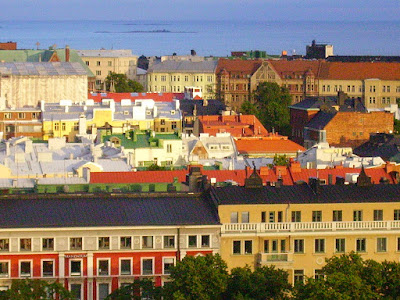The other memorable character from Athens was an old man, his body twisted and bent in various directions, who used to walk around the main railway station, shouting in his old man's broken voice: "O-ro-lo-gia! O-ro-lo-gia-!" - watches. I feel a stab of bad conscience to think how we, teenage brats from welfare states, used to laugh at him. Afterwards, as an adult, I have thought of Greece's history, with all its wars - the number of amputees amongst the older folk of Athens was high, still in the 1980s - and of poverty, polio, various other possible reasons for the old man's twisted shape. I have also understood what made the man sell watches at the station - at the time I used to think if anyone wants a watch, they'll surely go to a department store. Now I've understood it is a step above begging, an attempt to keep up (the remnants of?) the self-esteem of an old man, poverty-sricken, unable to work, uncared for either by his family or the state.
Decades later, when visiting Riga, I saw various services being offered for a few coins in an underground tunnel (does Riga have an underground system? It may well have been just an underpass of some sort), including a woman who had a set of scales. For a few pennies, people on their way to work could weigh themselves on her scales. That set of scales was her living, her prize possession, the line between her and abject poverty and begging.
To me, the merchandise of these European poor seems meaningful, laden with symbolism: watches. Scales. Measure your time. Weigh yourself.
Friday, September 29, 2006
What is remembered: Athens & Riga.
Labels: what is remembered
Subscribe to:
Post Comments (Atom)





No comments:
Post a Comment